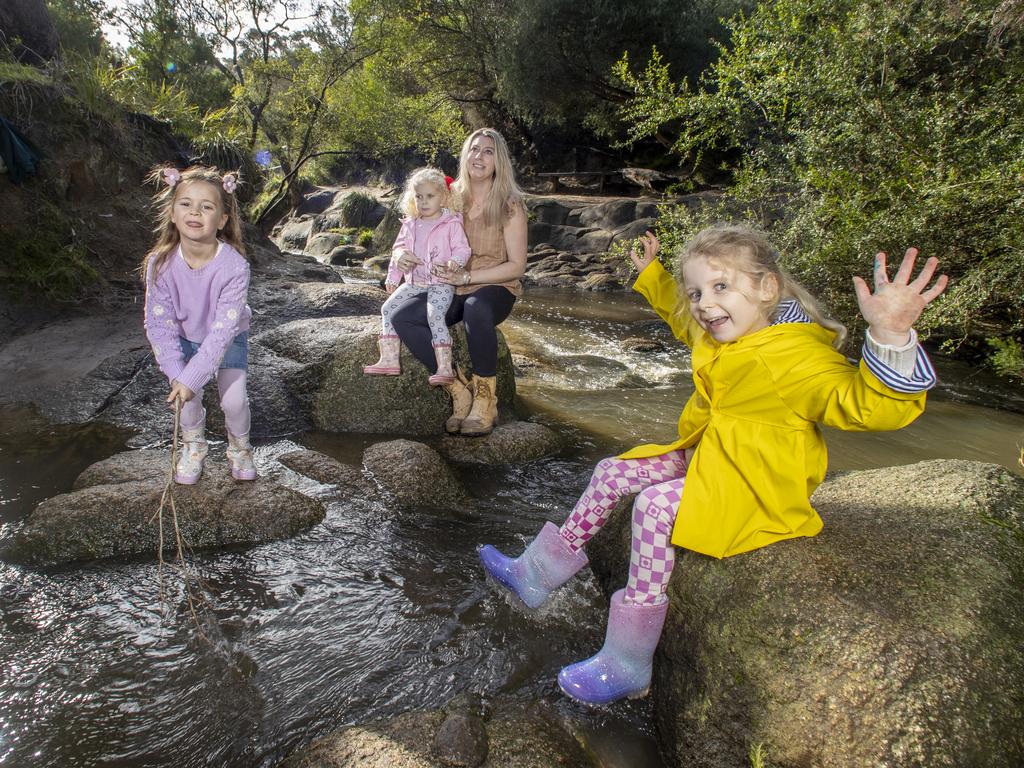Kinder kids learn more STEM skills in dunes and dirt than at a desk
Preschool students who can dump gendered toys and play outside in the bush or at the beach are more likely to perform better in maths, science and technology subjects once they start big school

READING LEVEL: GREEN
Preschool kids who play outside in the bush or at the beach are more likely to perform better in maths, science and technology when they start school.
A new study by Deakin University has found that four-year-olds and five-year-olds who attended “bush kinder” – where they learnt in parks, paddocks or in the sand – developed betters skills in these areas than peers who stayed inside.

Girls had the biggest improvement in these subjects when iPads and gendered* toys were replaced with nature, the researchers discovered. The study, which looked at children attending weekly bush kinder for a year, found kids aged four and five were more confident and likely to ask questions.
Deakin’s School of Education study co-author Chris Speldewinde said girls learnt the most science, technology, engineering and maths (STEM) skills.
He said this was because kids learning outdoors did not gravitate* towards traditional “boys’ toys”, such as trucks and sandpits, or to traditional “girls’ toys” like dolls and pretend cooking.

“Unstructured, outdoor play allows girls and boys to put away their dolls and stuffed toys and interact creatively with the environment around them to learn crucial STEM fundamentals*,” he said.
“For girls in particular, it takes away associations of gendered play and gets kids to be reliant on sticks and rocks for imaginary play.”
Mr Speldewinde said this early education could improve later academic performance in STEM subjects, including design and food technology, maths and science, because more girls would take an interest in them.
The shift to outdoor learning reflects an international trend. “Forest schools” have been popular in European early childhood education since the 1950s.

Currently only 150 Victorian kindergartens include outdoor learning in their weekly curriculums.
Victorian Education Department guidelines for bush kinders require boundaries around sites and ensuring kids are kept away from bodies of water.
Natalie Cross, who runs Bush Kindergarten in southeast Glen Eira, said stereotypes* disappeared outdoors.
“You would typically see boys playing in STEM areas and often the boys will dominate* inquiry sessions, whereas in an outdoor setting, everybody has the chance to participate,” she said.
GLOSSARY
- gendered: representing experience, opinions and preferences of one gender more than others
- gravitate: to be attracted to or move toward something
- fundamentals: the main foundation or most important rules or part of something
- stereotypes: fixed general idea or image of others, assuming they will behave in certain ways
- dominate: control, assert influence or power, take over
EXTRA READING
Time outdoors is good medicine for hi-tech kids
Play influences kids’ career choices
Gaming and sport could restore maths mojo
More girls to become STEM stars of the future
QUICK QUIZ
- Preschool kids who play at the beach and in the bush are likelier to perform better in which subjects once they reach school?
- Why does Mr Speldewinde believe bush and beach play benefits “girls in particular”?
- Bush Kindergarten operator Natalie Cross said what disappeared outdoors?
- Where in the world have “forest schools” been popular since the 1950s?
- What are Victorian state government guidelines for?
LISTEN TO THIS STORY
CLASSROOM ACTIVITIES
1. Create a day
What do you think kids should do in a day in bush kindergarten? Create a timetable or schedule of at least three activities for four- to five-year-olds. For each activity, write a description of what kids will learn from it.
Time: allow 30 minutes to complete this activity
Curriculum Links: English; Health and Physical Education; Personal and Social Capability
2. Extension
“There’s no difference between the way boys and girls play and learn!” Do you agree with this statement? Write paragraphs explaining your opinion on this. Make your writing as convincing as possible.
Time: allow 25 minutes to complete this activity
Curriculum Links: English; Health and Physical Education; Personal and Social Capability
VCOP ACTIVITY
To sum it up
After reading the article, use your comprehension skills to summarise in a maximum of three sentences what the article is about.
Think about:
- What is the main topic or idea?
- What is an important or interesting fact?
- Who was involved (people or places)?
Use your VCOP skills to re-read your summary to make sure it is clear, specific and well punctuated.

